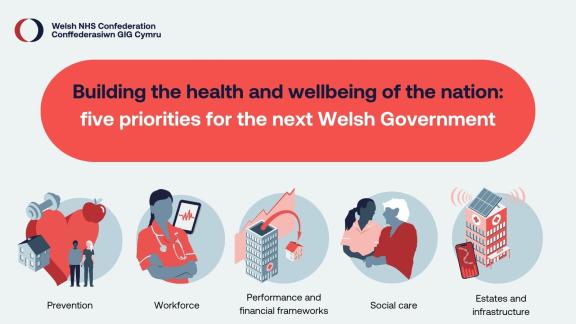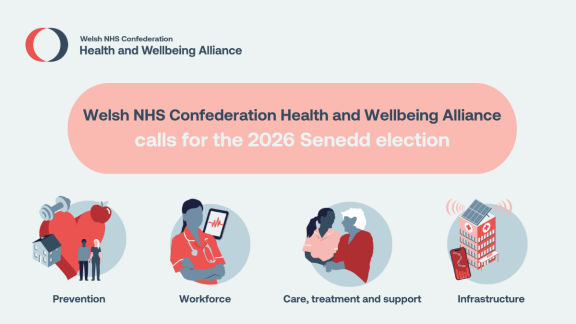Briefing for the debate on Welsh Government’s spending priorities 2026-27
Key points
NHS leaders welcomed the increase to the health and social care budget in the 2025-26 WG budget at a time where public finances across the UK continue to be extremely challenging. The additional funding has supported the NHS to respond to increasing demand on services, however the lack of long-term financial certainty presents challenges to effective planning and delivery of quality health and care services.
As highlighted in our recent report following a survey of NHS leaders, the Welsh NHS Confederation believe it is imperative there is a fundamental shift in the health and social care system over the next decade. At its heart, this is about moving from a reactive model (treating people when they are unwell) to a proactive one (focusing on prevention and early intervention).
To enable the shift in health and care services, NHS leaders recommend the following areas are prioritised:
- Investing in prevention: Increased investment in prevention is vital to shift the focus from treating illness to promoting health, reducing inequalities, and addressing wider determinants of health for long-term well-being and economic growth.
- Longer-term funding cycles: Both the UK and WGs must adopt longer-term funding strategies that address the wider determinants of health, including housing, education, and environmental conditions.
- Capital: The NHS requires a long-term capital strategy that invests in buildings, equipment, and digital systems, while also leveraging technological advancements to improve efficiency, patient outcomes, and staff environments.
- Workforce: The WG must prioritise a fully funded, long-term workforce plan to cultivate a multi-professional, digitally enabled, and highly motivated workforce.
- Social care: To transform the sector, further investment and an independent review are needed to secure a long-term, sustainable social care system that addresses workforce pay, conditions, access to publicly funded care, and data transparency.
- Digital investment: Further investment in digital infrastructure is needed to maximise the potential of digital innovations within the NHS, strengthening digital functionality across patient pathways for improved care delivery, data capture, and greater efficiency.
- NHS and the economy: Political parties must recognise the NHS’s economic contribution and leverage the NHS's spending power to address social, economic and environmental factors that widen inequalities and contribute to poor health.

Priorities for the NHS
Prevention
Currently, the intense pressure on health and care services makes investing in preventative measures a significant challenge. Analysis by the Future Generations Commissioner of the 2025-26 draft budget highlighted that about 15% of the budget is focused on actions with a preventative dimension, with less than 10% going towards actions that provide enough evidence to contribute to primary prevention, the highest level of prevention. This disparity between overall preventative spending and spending on evidence-based primary prevention highlights a pressing need to improve resource allocation to maximise the long-term health and wellbeing of the population.
We need further investment in prevention and a cross-government strategy to improve health and wellbeing and reduce inequalities. This will shift the focus from simply treating illness to promoting health and wellbeing, reducing inequalities, and tackling the wider determinants of health, boosting economic growth, and supporting people to be active partners in their own health and wellbeing.
Introduce longer-term funding cycles
Despite welcomed funding increases, the Welsh NHS, like other UK public services, has faced significant challenges due to various external pressures. These pressures have created increased financial uncertainty and deficits. Furthermore, to truly address the escalating health challenges, we must expand our understanding of health beyond traditional healthcare settings. This necessitates considering the wider determinants of health, which serve as the fundamental building blocks for our collective wellbeing.
The UK and WG must shift from short-term thinking to longer-term funding cycles to allow health and care leaders to plan for, and invest in, projected long-term demand and service improvement.
Capital (including digital infrastructure)
For more than a decade, the NHS across the UK has experienced a lack of capital funding, resulting in an estate in desperate need of extensive repairs and long-term investment. Low capital investment stands as one of the leading barriers to treating patients efficiently and effectively. As highlighted by the Health Foundation, the UK has a long history of underinvesting in health capital compared to its peer nations, spending approximately 55% less than the EU-14 and £33 billion less between 2010 and 2024 than comparable OECD countries. This chronic underinvestment has left the NHS with an ageing estate not designed to meet current demands.
The NHS needs to launch a long-term capital and infrastructure strategy that invests in its entire estate, including buildings, equipment, and digital systems, while also leveraging technological and research advancements like genomics and AI, to drive efficiency, productivity, and sustainability, ultimately improving patient outcomes and staff working environments.
Workforce
Continued investment in the health and care workforce is vital. Effective retention is the most cost-effective way to ensure the NHS and social care have the staff needed in the future. Our recent survey revealed that a resounding 71% of NHS leaders support commissioning Health Education and Improvement Wales (HEIW) and Social Care Wales to develop a fully funded, long-term workforce plan for Wales.
The WG must prioritise a long-term workforce plan for the NHS and social care workforce and their education. This will enable the implementation of a multi-professional, digitally enabled, motivated, engaged and valued workforce across the NHS and social care.
Social Care
Social care services play a crucial role in care pathways by keeping people well at home, preventing hospital admissions, and enabling faster, safer discharges home. However, the current state of the social care workforce paints a stark picture. The 2023 Social Care Wales workforce survey revealed that 26% of staff were looking to leave the sector within the next twelve months, and 44% within the next five years. Of those planning to leave, 58% cited pay as the reason, with 30% pointing to poor employment or working conditions.
To enable the transformation of the social care sector, further investment is required and an independent rapid review is required to develop a long-term agreement on the sustainability of the social care system. Within this, workforce pay and conditions, access to publicly funded care and transparency and consistency around the collection and reporting of social care data must be considered.
Digital Investment
By investing in digital and technology, there is an opportunity to help transform care and enable people to access information and treatment in a way that meets their needs and supports them to stay well. However, the current gap in funding digital programmes could disrupt progress on key digital programmes. Additionally, health and social care bodies must be supported to maximise the potential of digital innovations. This will enable people to access a wide range of health and care services from home, maintain their independence, health and wellbeing, and stay up to date with the latest information relating to their care.
We need further investment in digital infrastructure to fully leverage the potential of digital technologies within the NHS. Such investment will strengthen digital functionality throughout patient pathways, enabling effective data to be captured for informed decision-making and provide the tools necessary for improved care delivery and greater efficiency.
NHS and the economy
As stated in our briefing, ‘Investing in the NHS: Priorities for future government budgets’, the NHS plays a significant role in the economy and is considered an ‘anchor institution’. The NHS is well-positioned to use its spending power and resources to address adverse social, economic, and environmental factors that widen inequalities and contribute to poor health. Moreover, research by the NHS Confederation demonstrates that for every £1 invested in the NHS, the economy gets £4 back in gross value added (GVA). Furthermore, for every £1 spent on primary and community care, there could be increased economic output of £14.
When allocating budgets, the WG must acknowledge the NHS's significant contribution to economic activity and employment. As major employers, purchasers, and holders of capital assets, NHS organisations can leverage their spending power and resources to tackle the detrimental social, economic, and environmental factors that exacerbate inequalities and contribute to poor health.
Conclusion
NHS Wales organisations do not underestimate the significant challenges of public service budget-setting in the face of unprecedented demand on services, increased financial pressures and public expectation. However, NHS leaders, while understanding the government's current budgetary constraints, believe collaborative efforts with the government, all political parties, public sector leaders and communities across Wales is essential. This collaboration should focus on developing innovative solutions within a streamlined set of priorities that effectively balance immediate needs with a long-term vision.
Building a sustainable system requires a cross-sector approach to creating healthier and more prosperous communities, ultimately reducing future demand. Therefore, population health must be a central consideration in all government department budgets.
Further information
If you would like further information on any of the issues raised in the briefing, please contact Haleema Khan at Haleema.Khan@welshconfed.org
The Welsh NHS Confederation is the only membership body representing all the organisations making up the NHS in Wales: the seven local health boards, three NHS trusts (Velindre University NHS Trust, Welsh Ambulance Services University NHS Trust and Public Health Wales NHS Trust) and two special health authorities (Digital Health and Care Wales and Health Education and Improvement Wales). We also host NHS Wales Employers and are part of the NHS Confederation.



